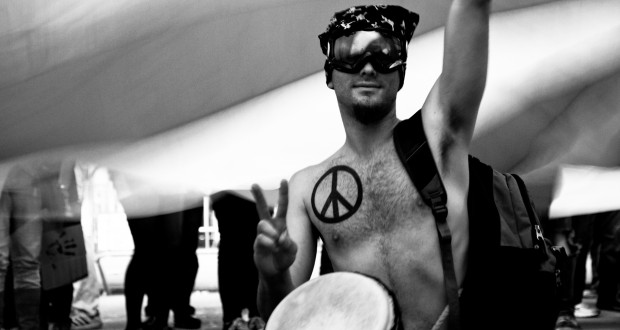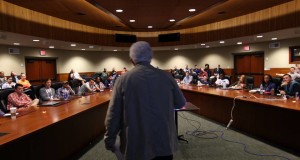Note: This is a chapter excerpt from my upcoming novel, JUMP.
This is a work of fiction.
—
Protesters.
It didn’t matter what religion you were, what political lever you pulled, whether you smoked marijuana or were against it, for or against the war … every week someone took a corner of Oakland’s sidewalks and professed war on whatever enemy it was that had to be slaughtered that day. It seemed that, as we got closer to midterms or finals, more protesters and megaphones made it out into the public, as though the pressure of looming exams blanketed everyone’s mind and fed the protesters with this sense of impending doom they needed.
Armageddon. It’s coming. And here is another terror you must be aware of!
On midterms week, there were so many protesting groups, that I actually watched one group stand by politely, waiting until the one currently “on stage” was either booed off by annoyed bystanders or had lost their voice from shouting.
Most of the time I could walk by unscathed, and make it to my next class without so much as eye contact, let alone having to throw away pamphlets with pictures of zoo animals wearing lipstick and women’s makeup.
I think the vegans were the worst, always primed to proclaim murder right after lunchtime, often managing to associate faces to whatever meat sandwich I’d just finished eating. The gay bashers were the loudest, either standing on stacks of milk crates or marching from one side of the walkway corner to the other, practically chasing people in their strides. The pro-lifers stood mute, metaphorical stand-ins for the victims depicted on their oversized canvases visible from half a dozen blocks away. The anti-war protesters were usually the most disorganized, frantic, and – ironically enough – the most aggressive, almost picking a fight with anyone who refused to take their leaflets. Of all the protesters, they were the ones who produced the most brawls: at least two by my count, while the others had none.
It was the day after I finished my last midterm that one of the Christian-Right groups took the prime spot, the corner across from the Cathedral of Learning where the pedestrian traffic was most congested.
“Are you saved?” I could hear one of them asking strangers frantically, moving from one to the next to hit as many people as possible before they could passed him by.
I tried to push away, closer to the road, where he couldn’t get me, but the crowd pushed me back toward him.
“Are you saved?” he asked an older woman a few people in front of me.
“Come on now,” she said, as though this were the third time she’d faced that question today. He held out a pamphlet to her, but she refusing to take whatever he was giving out.
“Are you saved?” he moved on to the next one.
“I’m good, buddy, thanks,” a man said, like he’d refused an offer to lunch.
Maybe he’d skip me. Maybe he’d turn the other way.
He didn’t.
“Are you saved?” he asked me. He held the pamphlet for me to take. His eyes beamed with hope, like those of a man asking an estranged woman, “Are you my mother?”
I was reminded, briefly, of that young man so many years ago who had embarrassed my mother when I was a boy.
I wanted to move off. Not say anything. But I froze. I froze not because I wanted to talk to this man, but because in the back of my mind I thought that maybe I should have had a good response prepared for him. After all, I grew up in a Christian home. I read the Bible. I went to church. Was I saved?
“Saved from what?” I blurted out loud.
“Excuse me?” he said.
“You asked if I was saved. Saved from what?” I asked.
He scoffed, as though I were missing an obvious point. His eyes darted to either side, then back at me. And I felt stupid for a moment, like I was a complete failure for not knowing what I should be saved from. Didn’t Pastor Rock always preach of salvation? Saved by Jesus. Jesus saves. Saves us … from what? I felt a slight panic for not knowing the answer in that moment, like that sensation of having lost your house keys.
Then I dug myself out of my own thoughts to observe this man, this fellow Christian. He too, it seemed, had no clue.
“Well …” he stammered. His arms dropped. “I’m not really sure.”
Then he remembered he’d been holding pamphlets. He pulled one up to his face, close, like he had bad eyesight, and referenced it like a cheat sheet for an exam.
Before he could answer me, I returned to the pedestrian flow.
I thought of Jesus then. Your typical image: lean and frail, slack jaw, face covered in blood, arms outstretched and hanging loosely by the nails, feet crossed on a stump attached to the base of the cross.
Why did you die? I thought. How did that save anyone?
And I realized then, that despite all the sermons on the topic of salvation I had heard growing up as a kid, I had never considered God as one who rescues. I had always seen God hovering, dark and shadowy, a meaner version of my father. If anything, by running away to college, I’d been trying to save myself.
From Him.
Oh my God, I thought, and I didn’t know whether that was half blaspheming or half prayer. Maybe fully both?
And like most Christian-minded kids my age, I did what most others would have with those questions. I ignored them. I pretended that they’d never surfaced to the consciousness of my brain. Because, one: it meant that I would have to seek some type of answer for them, and two: because I thought that somehow those questions made me unworthy.
I liked this new God I was seeing at Crossroads. I liked that he didn’t demand much of me. That he wasn’t oppressive, and he allowed us to have fun and make mistakes. Isn’t that the God anyone would want? If he chose to save me, who cares if I actually knew what it was from? If God was all forgiving, then he would forgive even my lack of knowledge. So I put it off my mind. For a while at least. Because it didn’t matter. That doctrine stuff, that was for God to worry about, not me: a mere man.
The answer to that question wasn’t why I had come to Pitt. I had come to Pitt to escape the God of my past. And I liked the new one I had found just fine.
(Feature photo by Phelix)
 Michel Sauret – Award-Winning Army Journalist | Independent Author Award-Winning Army Journalist, Independent Author
Michel Sauret – Award-Winning Army Journalist | Independent Author Award-Winning Army Journalist, Independent Author






